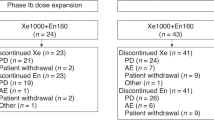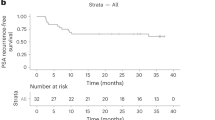Abstract
Purpose
AGS-1C4D4 is a human monoclonal antibody against prostate stem cell antigen (PSCA), a cell-surface protein expressed by most prostate cancers. AGS-1C4D4 is produced in Chinese hamster ovary (CHO) cells and has an identical sequence to AGS-PSCA, an anti-PSCA antibody produced in mouse hybridoma cells that has completed Phase I testing. Preclinical studies demonstrated comparability of AGS-1C4D4 to AGS-PSCA with respect to pharmacokinetics (PK) and tumor inhibition. However, because of differences in antibody-dependent cellular cytotoxicity between AGS-PSCA and AGS-1C4D4, a limited Phase I trial using AGS-1C4D4 was performed evaluating safety and PK.
Patients and methods
Thirteen patients with metastatic castration-resistant prostate cancer were enrolled. AGS-1C4D4 was administered intravenously every 3 weeks for four planned doses at 6, 12, 24, or 48 mg/kg. Primary endpoints were safety and PK. Secondary endpoints were immunogenicity and clinical activity. Disease assessments were conducted every 12 weeks and included radiographic and PSA evaluations. Patients with stable disease could receive extended treatment beyond four infusions.
Results
Adverse events were primarily grade 1–2, without any grade 3–4 drug-related toxicities or infusion reactions. Anti-AGS-1C4D4 antibodies were not detected. Similar to AGS-PSCA, serum AGS-1C4D4 concentrations declined biphasically and elimination was characterized by slow clearance (CL) and a long terminal half-life (t 1/2). Median CL for the four dose levels ranged from 0.10 to 0.14 ml/h kg, and t 1/2 ranged from 2.2 to 2.9 weeks. No PSA reductions ≥50% were observed. Six patients (46%) had radiographically stable disease, lasting a median of 24 weeks.
Conclusion
AGS-1C4D4 was well-tolerated and demonstrated linear PK. Despite preclinical differences in antibody-dependent cellular cytotoxicity, AGS-1C4D4 and AGS-PSCA have similar safety and PK profiles. The recommended Phase II dose is 48 mg/kg.



Similar content being viewed by others
References
Jakobovits A (2008) Monoclonal antibody therapy for prostate cancer. Handb Exp Pharmacol 181:237–256
Reiter RE, Gu Z, Watabe T et al (1998) Prostate stem cell antigen: a cell surface marker overexpressed in prostate cancer. Proc Natl Acad Sci USA 95:1735–1740
Gu Z, Thomas G, Yamashiro J et al (2000) Prostate stem cell antigen (PSCA) expression increases with high Gleason score, advanced stage and bone metastases in prostate cancer. Oncogene 19:1288–1296
Han KR, Seligson DB, Liu X et al (2004) Prostate stem cell antigen expression is associated with Gleason score, seminal vesicle invasion and capsular penetration in prostate cancer. J Urol 171:1117–1121
Lam JS, Yamashiro J, Shintaku IP et al (2005) Prostate stem cell antigen is overexpressed in prostate cancer metastases. Clin Cancer Res 11:2591–2596
Saffran DC, Raitano AB, Hubert RS et al (2001) Anti-PSCA monoclonal antibodies inhibit tumor growth and metastasis formation and prolong the survival of mice bearing human prostate cancer xenografts. Proc Natl Acad Sci USA 98:2658–2663
Jakobovits A, Gudas JM, Jia X et al (2005) Therapeutic potential of AGS-PSCA: a fully human monoclonal antibody to prostate stem cell antigen (PSCA) for the treatment of prostate and pancreatic cancers. J Clin Oncol 23(Suppl): abstract 4722
Morris MJ, Eisenberger MA, Pili R et al (2009) Phase Ib study of AGS-PSCA, an anti-PSCA human antibody, in castration-resistant prostate cancer. Genitourinary Cancers Symposium: abstract 174
Therasse P, Arbuck SG, Eisenhauer EA et al (2000) New guidelines to evaluate the response to treatment in solid tumors. J Natl Cancer Inst 92:205–216
Pound CR, Partin AW, Eisenberger MA et al (1999) Natural history of progression after PSA elevation following radical prostatectomy. JAMA 281:1591–1597
D’Amico AV, Chen MH, Roehl KA et al (2004) Preoperative PSA velocity and the risk of death from prostate cancer after radical prostatectomy. N Engl J Med 351:125–135
Gu Z, Yamashiro J, Kono E et al (2005) Anti-prostate stem cell antigen monoclonal antibody 1G8 induces cell death in vitro and inhibits tumor growth in vivo via a Fc-independent mechanism. Cancer Res 65:9495–9500
Amara N, Palapattu GS, Schrage M et al (2001) Prostate stem cell antigen is overexpressed in human transitional cell carcinoma. Cancer Res 61:4660–4665
Argani P, Rosty C, Reiter RE et al (2001) Discovery of new markers of cancer through serial analysis of gene expression: prostate stem cell antigen is overexpressed in pancreatic adenocarcinoma. Cancer Res 61:4320–4324
Acknowledgments
This work was supported by Agensys Inc., a wholly owned subsidiary of Astellas Pharmaceutical Inc. Additional support was provided by the Department of Defense Prostate Cancer Clinical Trials Consortium (grants PC051382, W81XWH-06-1-0241, W81XWH-08-PCRP-CCA) and by the National Cancer Institute (grants K23CA102544, 5P30CA006973).
Conflicts of interest
ESA, MAE, SRD, SFS, and HIS indicate no potential conflicts of interest. KJM and MEV are employees of Agensys Inc. MAC and MJM have received research funding from Agensys Inc.
Author information
Authors and Affiliations
Corresponding author
Rights and permissions
About this article
Cite this article
Antonarakis, E.S., Carducci, M.A., Eisenberger, M.A. et al. Phase I rapid dose-escalation study of AGS-1C4D4, a human anti-PSCA (prostate stem cell antigen) monoclonal antibody, in patients with castration-resistant prostate cancer: a PCCTC trial. Cancer Chemother Pharmacol 69, 763–771 (2012). https://doi.org/10.1007/s00280-011-1759-9
Received:
Accepted:
Published:
Issue Date:
DOI: https://doi.org/10.1007/s00280-011-1759-9




